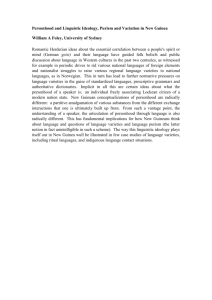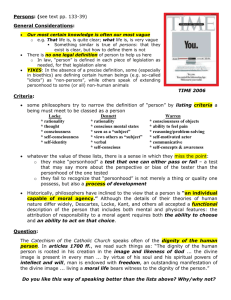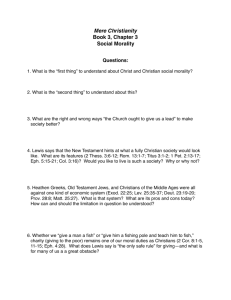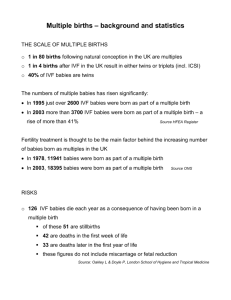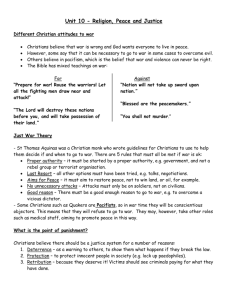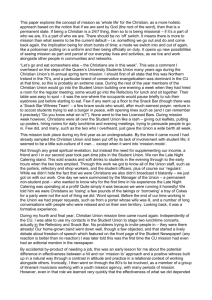Our Reflection and Our Responsibility
advertisement
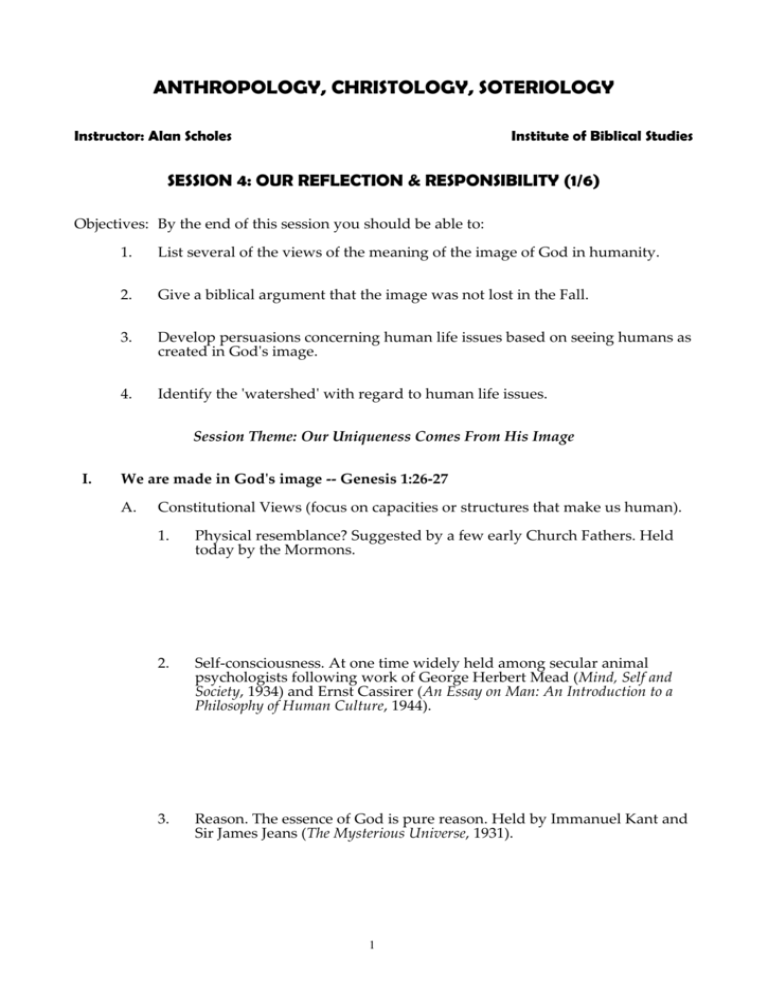
ANTHROPOLOGY, CHRISTOLOGY, SOTERIOLOGY Instructor: Alan Scholes Institute of Biblical Studies SESSION 4: OUR REFLECTION & RESPONSIBILITY (1/6) Objectives: By the end of this session you should be able to: 1. List several of the views of the meaning of the image of God in humanity. 2. Give a biblical argument that the image was not lost in the Fall. 3. Develop persuasions concerning human life issues based on seeing humans as created in God's image. 4. Identify the 'watershed' with regard to human life issues. Session Theme: Our Uniqueness Comes From His Image I. We are made in God's image -- Genesis 1:26-27 A. Constitutional Views (focus on capacities or structures that make us human). 1. Physical resemblance? Suggested by a few early Church Fathers. Held today by the Mormons. 2. Self-consciousness. At one time widely held among secular animal psychologists following work of George Herbert Mead (Mind, Self and Society, 1934) and Ernst Cassirer (An Essay on Man: An Introduction to a Philosophy of Human Culture, 1944). 3. Reason. The essence of God is pure reason. Held by Immanuel Kant and Sir James Jeans (The Mysterious Universe, 1931). 1 4. Creativity. We are the only earthly beings who create (or in the words of fantasy novelist, J. R. R. Tolkien, "sub-create.") TOLKIEN ON CREATIVITY AS GOD'S IMAGE Fantasy remains a human right: we make in our measure and in our derivative mode, because we are made; and not only made, but made in the image and likeness of a Maker. J. R. R. Tolkien, "On Fairy Stories" in The Tolkien Reader, p. 55. II. 5. Moral capacity. What makes us distinct is that we can understand the concept of right and wrong. 6. Spirit. Those who hold this view, interpret Jesus' words in John 4:24 to mean that God's essence is spiritual. B. Dominion. This view argues that the Genesis 1:26 reference to image must be interpreted in light of the words that follow, "let them have dominion . . . ." C. Relationship. A more recent view has been proposed by Karl Barth. Whatever it is, the Bible teaches that even fallen humans retain God's image. A. Adam retained the image after the Fall and passed it on -- Genesis 5:1, 3. B. The prohibition against murder was based on the image -- Genesis 9:6. C. Verbal abuse is condemned on the basis of the image -- James 3:9. (See also 1 Corinthians 11:7, Colossians 3:10.) 2 III. Seeing humans in God’s image is the key to human-life issues. A. Abortion: we passed the watershed in America with "Roe v. Wade" (1973). The decision was a move back to pre-Christian, pagan law. Justice Blackmun, who wrote the majority opinion, made it abundantly clear that if any religion was to be a guide to him, it would be paganism. He alluded to the practice of the Persians, the Greeks, and of the Romans, but he ignored Christianity. The Hippocratic oath, which has been taken by physicians for the past 2,000 years, specifically prohibits abortion and the suggestion of it. Justice Blackmun laid this aside as having no relevance today. C. Everett Koop, The Right To Live, The Right To Die, p. 38). B. It took less than a decade for the next "logical" step: infanticide. The April 1982 decision of an Indiana court allowing a six-day-old infant to be starved to death because of congenital problems raised with clarity the question of the sanctity of human life in this country. The judge in that case reasoned the parents could lawfully refuse to feed "Infant Doe," which led to a certain death by starvation. Infanticide, once unthinkable, burst into the open and became thinkable--a reality. John W. Whitehead, The Stealing of America, p. 43. We have unleashed a hoard of ethical dilemmas. C. Test tube babies. As Christians, we must object to the practice of taking several ova, fertilizing them, and freezing them (because it’s cheaper that way). The only ethically justifiable procedure (which some Christian doctors will do) is to take one ovum at a time and try to fertilize it. D. Euthanasia. In dealing with this subject, we must try to distinguish between "passive" and "active" taking of life. Active mercy killing is always murder and should be opposed by Christians at the conviction level. However, when we are dealing with so called "passive euthanasia" (misnamed), there is room for Christians to disagree at the persuasion or opinion level. 3 E. Sex-change. Christians would have to oppose most sex-change operations on the basis of Jesus' words in Mark 10:6-10 and other scriptures. For exceptions, see discussion below. SCHOLES ON EXCEPTIONS TO SEX CHANGE PROHIBITION The one instance where a Christian could ethically advocate such an operation would be where there was medical uncertainty as to the actual sex of the child. There have been (extremely rare) cases where a baby has appeared to be female externally, was raised as a girl by her parents but following the onset of puberty was discovered to actually have (somewhat malformed) male sex organs inside and a generally male hormonal makeup. It would seem the Christian view in this sort of case must be that as a result of the diffuse results of the fall, through no direct fault of the child or the parents, a horrible mistake has happened. Either choice might be moral; to "change her into a man" through surgery and hormone therapy or to "make her a full woman" by similar processes. In either case, it could be viewed as a sex-change operation. The choice should be carefully made, weighing medical, psychological, and social consequences. In this case, a "sex-change operation" would not be morally wrong. But of course, the fact that a small number of these operations may be justified does not legitimize the whole spectrum of sex changes procedures that are taking place. A.K.S. F. Unthinkable atrocity. Six months after the decision in Roe v. Wade, Dr. Peter A. J. Adam, an associate professor of pediatrics at Case Western Reserve University, reported to the American Pediatric Research Society on research, he and his associates had conducted on twelve babies (up to twenty weeks old) who had been born alive by hysterotomy abortion. These men took the tiny babies and cut off their heads--decapitated the babies and cannulated the internal carotid arteries (that is, a tube was placed in the main artery feeding the brain). They kept the diminutive heads alive, much as the Russians kept the dog's heads alive in the 1950s. Take note of Dr. Adam's retort to criticism: "Once society's declared the fetus dead, and abrogated its rights, I don't see any ethical problem.... Whose rights are we going to protect, once we've decided the fetus won't live?" Whitehead, Ibid. pp. 52-53. G. As biblical Christians we must insist that basic personhood begins at conception. All genetically complete (as in a fertilized ovum) humans are “persons.” LIFE BEGINS AT CONCEPTION Most Christian ethicists that Christianity Today interviewed hold that personhood begins at conception, though many of them note that the practices of evangelicals don't always reflect that view. For example, during the in vitro fertilization (IVF) process, embryos are frozen, rated for their quality, discarded if they hold genetic defects, or thawed and dumped in the trash if they are no longer needed. None of these practices would be acceptable in the case of fully developed persons. But most are accepted by evangelicals undergoing IVF treatments. 4 LIFE BEGINS AT CONCEPTION (CONTINUED) The scale of IVF and other assisted reproductive technologies (ART) is also a concern. In 2001, the last year for which statistics are available, the Centers for Disease Control reported there were 107,587 ART attempts (known as cycles) resulting in 40,687 babies. That total is up from 64,724 cycles and 20,659 babies in 1996. With an average cost of $12,400 per cycle, infertility treatment has become a billiondollar industry. And there's enormous potential for growth. The Association for Reproductive Medicine reports that only 5 percent of the estimated 2.1 million infertile couples have used IVF. To capitalize on this potential, a number of clinics have begun offering "100 percent money-back guarantees" and financing for patients who sign up for ART discount packages. IVF undermines the value of human life and paves the way for using embryos as raw material for biotechnology, argues Amy Laura Hall, an assistant professor of theological ethics at Duke Divinity School. In coming years, she believes, evangelicals will face a test of resolve on the question of prenatal life. "For years, evangelical leaders have been very clear on the question of life and personhood beginning at conception," Hall says. "Now that we have found a use for embryos, with the possibility of healing ourselves and healing our children, we are tempted to rethink our position on prenatal life." She points to an irony of the evangelical pro-life commitment: "Now that we are being called to bear the sacrifice of a witness to life, we are tempted not to sacrifice." C. Christopher Hook, who teaches ethics at the Mayo Clinic, is also concerned about the practices of IVF. But he believes those practices should be reformed, rather than halted. One alternative is to limit the number of fertilized eggs to only the number that a couple will implant. Stunningly, technology also can be harnessed for a lesser-known alternative. Clinics can freeze fertilized eggs at the pronuclear stage—before the sperm and egg DNA are fused. "If we cryo-preserve at that point," Hook says, "we don't have as much worry about the loss of life." This technique further muddies the issue of when human life and personhood begin. In any case, Hook says, such reforms mean Christian couples have to be specific about their beliefs when talking with doctors. Gilbert Meilaender, professor of Christian ethics at Valparaiso University, says we must restore the notion that a person is something more than a set of capacities. Instead, he argues that all human life has value because God cares for it regardless of capacities. For example, he says, while a Scriptural passage like Psalm 139:13-16 ("You knit me together in my mother's womb …") may not be a "proof text" for personhood at conception, it does show that "God's care and his hand are on those who have no capacities." Because we are of equal dignity, according to Meilaender, we are not at each other's disposal. Bob Smietana, “When Does Personhood Begin?” in Christianity Today, July, 2004. www.christianitytoday.com/ct/2004/007/7.24.html IV. Remember: God's gracious love and forgiveness can cover and heal any sin! 5

